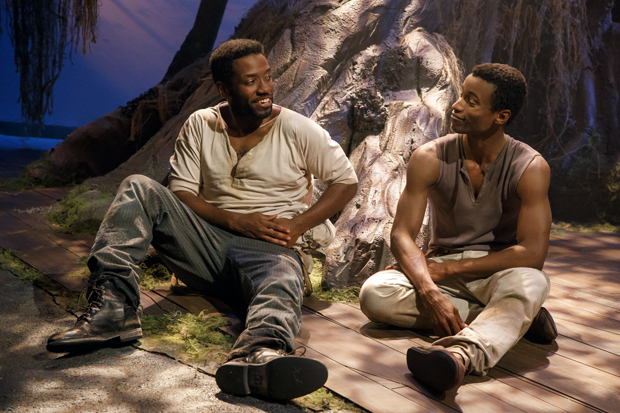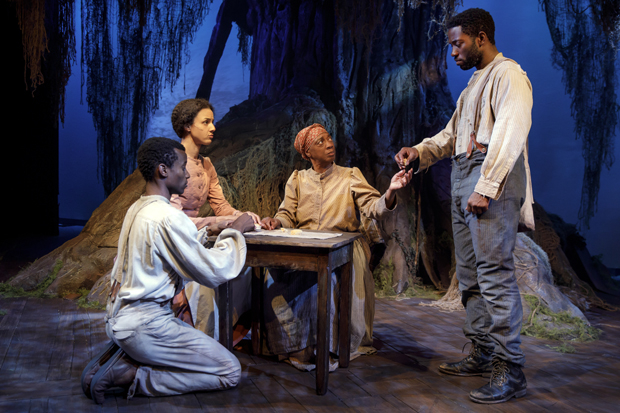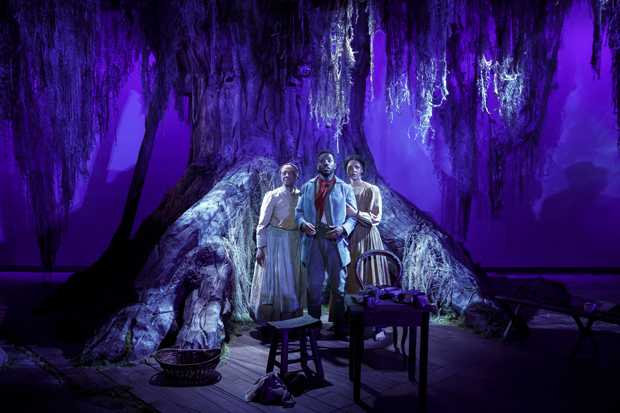Sugar in Our Wounds Rips the Band-Aid off Queer Black Love during the Civil War
There are two sides to sweetness in this world premiere from Manhattan Theatre Club.

(© Joan Marcus)
It's June in New York. We know because there are rainbows everywhere, including on the outside of our show programs, with many more printed inside in advertisements for Cadillac and Bloomingdale's. Ostensibly, this rainbow-flagged fealty is evidence of a great leap for LGBT people. But something feels missing from this corporate branding of the queer experience: A sense of history, complexity, and profound love. Donja R. Love valiantly searches for all three in Sugar in Our Wounds, now making its soaring world premiere with Manhattan Theatre Club at New York City Center.
Sugar in Our Wounds is the first in a trilogy of plays depicting queer love through black history. It tells the story of four slaves on a plantation in the Deep South circa 1862. The light-skinned Mattie (Tiffany Rachelle Stewart) works in the big house, receiving a daily dose of scorn from the plantation owner's daughter, Isabel (Fern Cozine in a performance that tastes like poisoned molasses). Isabel is a bit tenderer toward fieldworker James (Sheldon Best), stopping by the shack with her Bible to give him reading lessons. We're not sure he needs them from her, though: James is sensitive and smart, obtaining information about the war from a filched newspaper whenever he can. "You gots uh sweetness ta ya dat make ya special," remarks Aunt Mama (Stephanie Berry), the ancient woman who raised him and Mattie. She says it with a knowing smile as they sit beneath the massive weeping willow from which all of James's male ancestors were hanged. Their lives change with the arrival of a new slave named Henry (Chinaza Uche). Willful, handsome, and dark as night, he exudes a magnetism that proves to be very alluring to both James and Mattie.

(© Joan Marcus)
Uche's enigmatic performance makes us see why: His eyes draw us in like a beacon while also concealing a lifetime of pain. Henry's armor only seems to melt away when he is with James, whom Best embodies with boyish innocence. Together they radiate a breathless energy, the kind that can only come from discovering a new world or lost treasure. It contrasts highly with Henry's fumbling interactions with Mattie. Stewart charms us with her sweet vulnerability before breaking our hearts. As Aunt Mama, Berry delivers the most memorable performance of the play: Her every movement and syllable feels organic in a performance that conveys vitality and stubborn persistence.
These exhilarating performances spring from the dramatic tension of the script. Love smartly sets his story in the months before the Emancipation Proclamation, as a whole way of life is on the brink of collapse. Still, they approach their impending freedom with suspicion, understanding something that too many gay activists, resting on their laurels after marriage, have forgotten: Just because it's written down on paper in Washington doesn't mean it will actually matter in the real world.

(© Joan Marcus)
Performance and design come together in director Saheem Ali's production, which takes full advantage of the high stakes to create a world that is simultaneously enchanted and all too real. This starts with the giant tree at the center of Arnulfo Maldonado's set: imposing, brimming with secrets, and fed by the blood of slaves. Trying with all their might to climb it, neither James nor Henry ever reaches the top. Dede Ayite's weathered costumes tell the story of a lifetime of improvisation in the quest for survival. Jason Lyons conjures fantastic nights with moonlight streaming through the weeping branches of the tree. Palmer Hefferan shifts the mood in the room with a sound cue, whether it is the southern ambience of cicadas or the ominous clamor of a pack of hounds in the distance.
Set around a makeshift family, Sugar in Our Wounds implausibly manages to find love in the most terrible of circumstances. It searches for a queer history that passed without record, while simultaneously pointing toward a future in which our rigid taxonomy of sexual identities is no longer necessary to achieve political equality. If you're exhausted by the onslaught of treacly slogans and corporate branding that accompanies every Gay Pride month, this play will come as a breath of fresh air.









